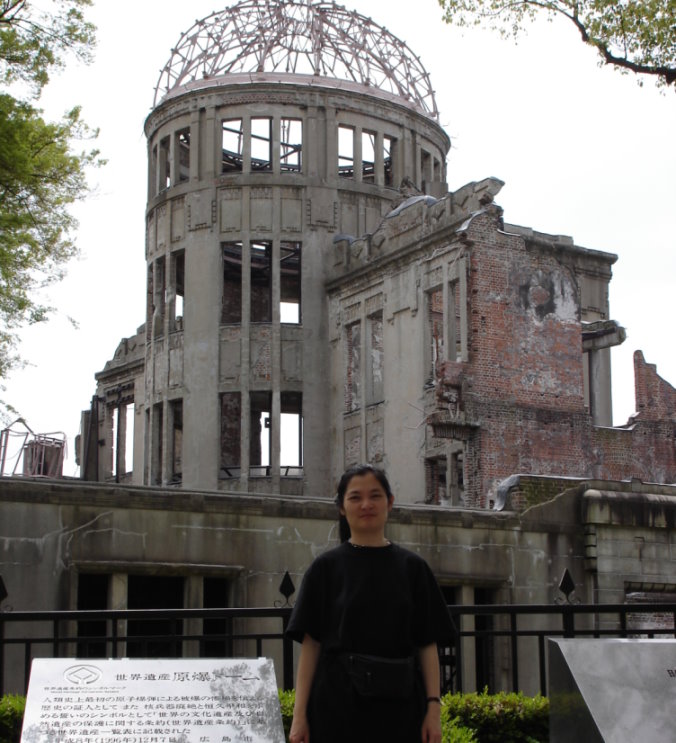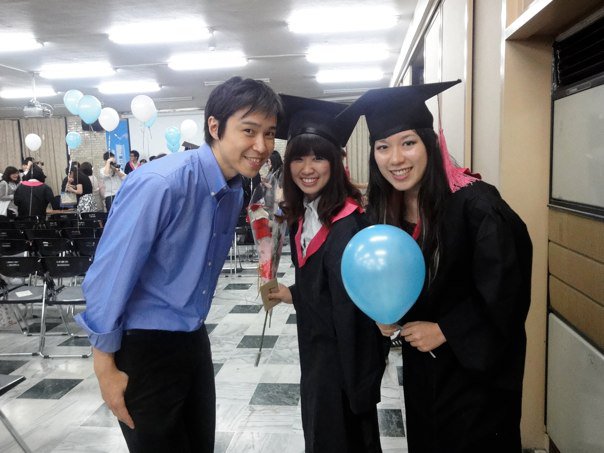| :
Sept, 2010
Why I like Taiwan

by Dr. Michael Yeldham
I first came to Taiwan in 1991. At the time, I was interested in working overseas because I wanted to do something different in my career. A friend of mine was planning to work in Taiwan, so I decided to give it a try here as well. Before I got here, basically all I knew about Taiwan was that Chiang Kai-Shek had led the Nationalist Chinese here in 1949. My father was my geography teacher at school, and that’s one thing I remember him teaching us. The only other thing I knew was from another friend who had worked here who told me that the people were very nice.
After I arrived, I immediately saw what my friend meant. The people were especially friendly, and nice to me, and I’ve enjoyed being here ever since. I married my wife here ten years ago. We’ve gotten along really well ever since. I also like her family very much, and always look forward to our family gatherings. At these gatherings, I like to joke around with my young nephews and nieces and tell them far-fetched stories. So last year they got even with me. … Some of my hair has gone gray (some parts even white). So to get even with me, they were putting white napkins on their heads and laughing as they called me “Bai tofa”.
In my job as an English teacher, I’ve very much enjoyed teaching Taiwanese students. They are respectful and grateful to their teacher. They also like having fun in class. That fits in nicely with my teaching philosophy, where I reason that study doesn’t always have to be unenjoyable to be beneficial. It can also be interesting and fun. I think that when people are interested in something, they learn better – provided the teacher also has a sound grasp of the content and is able to impart it effectively to the learners. I think being interested in learning also increases the chances that students will want to keep learning later when they finish studying formally.
Since I started at Fu Jen last semester, I've noticed that many of the other teachers have a similar philosophy to mine. That makes the atmosphere in the English department an especially pleasant one.
back
Taiwan, Nice to See You Again
by Dr. Adeline Teo

Some unique emotional attachments are very difficult to describe, but sometimes they warm our hearts when we allow ourselves to be reminiscent of our past. This warmth is how I feel toward Taiwan, a place where I lived for a short time in my early twenties. To me, Taiwan is like a very old acquaintance whom I can’t recognize easily when we happen to pass by each other; however, she is someone who triggers a special memory when her name is mentioned. The Taiwan I knew was one that was beginning to bloom economically during the pre-Internet era. Back then, traffic in Taipei was a mess, and a common scene I encountered was the police patrol busily chasing after illegal vendors at the food booths surrounding many university campuses at night. If I recall correctly, the World Trade Center on Wu Xin and Xin Yi Streets was the fanciest complex in Taipei, and one of the most impressive architectural designs, at that time, was a fairly new Grand Hyatt Hotel.
Before I learned enough about Taiwan, I left for another very exciting country, the United States. I did not foresee that I would spend almost 20 years in the U.S. before returning to Taiwan. Throughout the time when I lived in the United States, every once in awhile the name of my old acquaintance would appear on the TV news. The media’s coverage of Taiwan ranged from the establishment of the Taiwanese universal healthcare system (which I really envy from an American’s perspective), the political victory of the DPP that resulted in the first Taiwanese President from a non-KMT party, to the construction of the MRT system that has improved traffic in Taipei drastically. Some dramatic events I heard about also included an overwhelming report on the fairy-tale wedding ceremony of Princess Chen and her doctor husband, followed by a series of their family’s political and money laundry scandals. Later on, I read about President Ma taking over the leadership and his policy of gradually loosening Taiwan’s historically tense relationship with China.
Meanwhile, some Taiwanese stars have risen to the international spotlight. In the baseball arena, Chien Ming Wang has become a well-known name globally. In the music industry, Lo Da Yu and Chen Shu Hua have been replaced by the pop icons Jay Chao and Jolin, who have introduced Taiwanese pop music to a much larger audience than their predecessors.
So much has changed in Taiwan since the time I left and my recent return, and I believe change will continue in today’s Internet era. Having lost first-hand contact with this old acquaintance for almost 20 years, I know I am extremely ready to explore and discover the new Taiwan. I also believe that being a faculty member in the English Department at Fu Jen University is a very important door that will allow me to discover Taiwan at a deeper level. I look forward to working with my new colleagues and students at Fu Jen University. Hopefully, some day I will be able to announce proudly to my friends all over the world that Taiwan, an old acquaintance of mine, has become a sweet and close friend indeed.
back
Returning to My Cultural Roots
by Dr. Donna Tong

I am an American-raised Taiwanese, and as I have grown older I have come to value more and more my Taiwanese heritage. My family immigrated to California when I was two years old, and so I have very few childhood memories of Taiwan.
I have been back to Taiwan periodically, mostly as a visitor and tourist. My parents’ siblings have remained in Taiwan, and I usually stayed with aunties and uncles when I visited. One of my earliest childhood memories of visiting Taiwan was most likely when I was around six years old. We were staying with my grandmother in Hsinchu, and for some reason my uncle had brought home a live chicken which he proceeded to nearly decapitate in front of me. Even then, I knew that he did it deliberately, trying to disgust and scare his little American niece. Well, I had the last laugh! I didn’t get scared or disgusted. I just calmly watched him bleed the chicken out into a pot. I just thought, wow, Taiwanese people really like their chicken meat to be fresh!
One of my clearest impressions of Taiwan is the horrible traffic and the ways that the motorists seem nearly to be suicidal. Arguably, the motorist culture means that Taiwanese motorists have better reflexes than motorists in other countries, though I suspect this tendency is more out of necessity than from natural ability. This impression has stayed with me through the years, though admittedly things have gotten much, much better recently. I tend to attribute this improvement to the increased policing of moving traffic violations through traffic cameras, though the improved roadways and public transportation, especially the MRT lines, probably also contributed. :)
But more seriously, I have always enjoyed my visits to Taiwan as I was growing up in the United States. I really respect and appreciate Taiwanese culture. I like the way that family is considered important by the Taiwanese, and how that value emerges in the close ties among my relatives, the way that my relatives are always willing to help me with anything I may need, and even feed me on occasion. Perhaps it’s now a cliché to mention how the Taiwanese esteem education and hard work, but those cultural values really impacted my own educational track and career choices.
Working at Fu Jen University gives me the opportunity not only to teach American literature and continue my academic research but also to improve my knowledge of Mandarin Chinese, to learn more about my cultural roots, and to enjoy Taiwanese food. I find Taiwanese people to be very generous and welcoming, willing to help even complete strangers. The students are courteous and kind. I have enjoyed the past semester at FJU, and I look forward to more semesters working with the students and faculty of the English Department.
back
Happy about Being Here:
Dr. Kentei Takaya
Written by Carol Hung

Walking into Professor Kentei Takaya’ s office, you might be surprised that it is decorated in a simple style, or Wabi-sabi, the term for Japanese aesthetics. In fact, the decoration tells a story of its owner, that is, the genuine and cheerful character of Professor Takaya.
Growing up in Taiwan and Japan, he regards both countries as his home town and loves them equally. If these two similar cultures make him a successful communicator, then studying overseas is a valuable experience to him in terms of cross cultural communication. Perhaps that is also the reason why he is always optimistic— the chances of getting along with different people make him confident and thus enthusiastic about everything.
Being a new teacher in the English department for two years, Professor Takaya is warmly welcomed by the whole department. In fact, in the English department students usually work closely with teachers, so there are no so-called strict hierarchical “teacher-student” relationships. Perhaps that is why students could always enjoy getting along with teachers.
When asked to express his opinion about being a “popular” teacher in our department, to our amazement, Professor Takaya humbly replied that he did not know if he is a “star”. However, one thing for sure is that he does enjoy being a member of the “family” in the English department.
Perhaps it is because of his perfect willingness to help students that makes Professor Takaya an exceedingly likable teacher. To the students in our department, professors are not merely teachers; rather, they are more like our friends.
After this interview, we could strongly feel that the friendly atmosphere in our department has brought Professor Takaya a warm glow of satisfaction. His cheerful smile spoke volumes when he described the feelings of working here: “I do see English department as a family… and I am very happy about being here, really.”
back
|